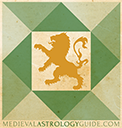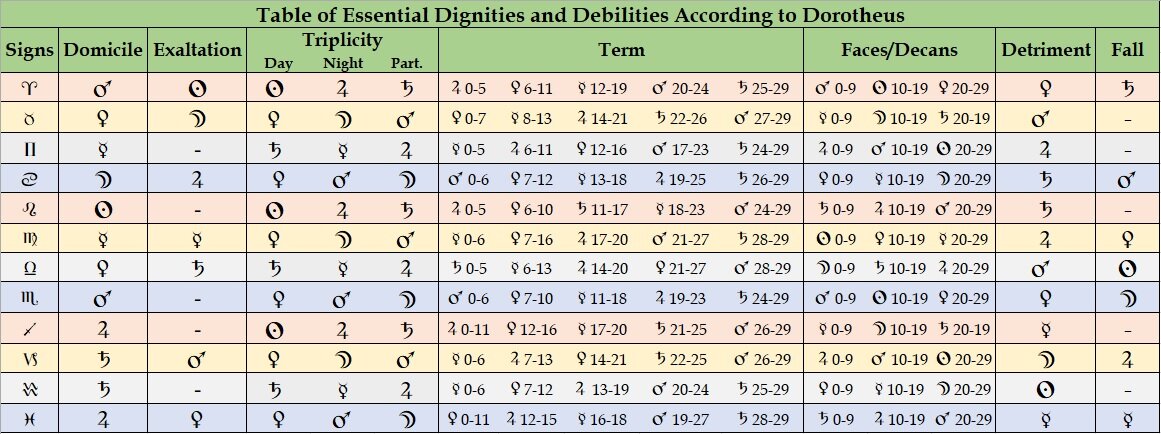Table of Essential Dignities
The essential dignities of the planets are an important astrological technique and absolutely vital in determining planetary condition. The placement of planets within signs or particular parts of signs can greatly affect a planet's ability to express itself or bring about the effects it is responsible for in any given chart. Generally, the more dignity a planet has by being in a higher form of dignity the more effective it is in doing it's job.
Throughout astrology's long history there has been some disagreement about how the dignities ought to be assigned. Specifically, there are alternative philosophies and assignments for triplicity and term and these differing systems are both shown below in their respective tables.
The table above maps out the dignity scheme utilized by the majority of astrologers throughout the medieval tradition. This table is often cited or referred to as belonging to the first century astrologer Dorotheus of Sidon. The truth is that Dorotheus is not the author of this table, and the defining characteristic of this table and the reason why it is so often attributed to Dorotheus is that it utilizes the Triplicity rulerships that he describes in detail in his work Carmen Astrologicum. Another defining feature of this table is that it utilizes the Egyptian Term system instead of the Chaldean or Ptolemaic system.
This second table displays the dignities and debilities of the planets according to Cladius Ptolemy. This set was more popular in the Renaissance period and many contemporary classical astrologers still utilize this system, or at least the system as it was recorded by English astrologer William Lilly in his work Christian Astrology. The table above was created with the information given in Tetrabiblos and not the more familiar Lilly version.
Some distinguishing characteristics of Ptolemy's dignity table involve his removal of the third Triplicity lord and assigning Mars as the sole ruler of the water signs regardless of day or night considerations. The Terms are also different from those listed in the above Dorothean table. The Dorothean table utilizes the Egyptian Term system, whereas the Ptolemaic table utilizes a Term system of - presumably - Ptolemy's own design. Several positions within this system are unclear. For example, the first term of Leo may belong to either Jupiter or Saturn, the third term belongs to either Saturn or Venus, but Jupiter is also selected to be the ruler of the fourth term. There are also cases where the number of degrees assigned is in dispute. The first term of Scorpio has four possible assignments; Venus rules it and has 7 degrees, Venus rules it and has 8 degrees, Jupiter rules it and has 7 degrees, or Jupiter rules it and has 8 degrees.
It seems clear that the main reason the Ptolemaic dignity table was not very popular in the medieval period is due to the confusion surrounding the assignments and the alternative tables that transcribers ultimately produced. The Egyptian terms included in the table attributed to Dorotheus have had a much more consistent transmission experience.
There is also a more political reason involved for the revival of the Ptolemaic table in the Renaissance period. During this time, Muslim Turkish armies from the Middle East had essentially cut off most of Western Europe from the rest of the world, igniting fear and anger in the peoples of this part of the world. As a result of growing anti-Muslim sentiment in countries like England, Italy, and France, scholars sought to revitalize the intellectual tradition of the Greeks, bypassing the hundreds of years of information gathered and developed by Arabic scientists. For astrologers in particular, this manifested as an interest in more Hellenistic types of astrology with Ptolemy as the patriarch of a pure, Greek astrology. Some astrological practitioners took this further than others, with astrologers like Jean Baptiste Morin declaring anything that was perceived to have been invented by Arabic or Muslim astrologers as worthless, including the Lots and the entire branch of horary astrology (which Morin decries as "Arabic devilry").
Regardless of the myriad reasons why the Ptolemaic table may be attractive to some astrologers historical and contemporary, the Dorothean dignity table is considered much more complete and true to the original philosophical structure of the dignities listed and is the recommended table for students of medieval astrology.


